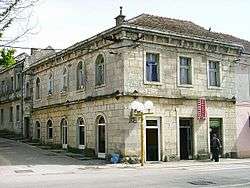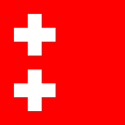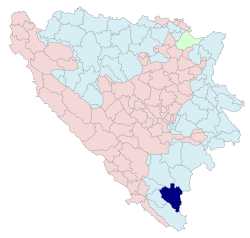Bileća
Bileća (Serbian Cyrillic: Билећа) is a town and municipality located in Republika Srpska, an entity of Bosnia and Herzegovina. As of 2013, the town has a population of 7,476 inhabitants, while the municipality has 10,807 inhabitants.
Bileća Билећа | |
|---|---|
Town and municipality | |
 Bileća | |
 Flag  Seal | |
 Location of Bileća within Bosnia and Herzegovina | |
| Coordinates: 42°52′N 18°26′E | |
| Country | Bosnia and Herzegovina |
| Entity | Republika Srpska |
| Settlements | 61 (2013.) |
| Government | |
| • Mayor | Miljan Aleksić (SNSD) |
| • Municipality | 632.33 km2 (244.14 sq mi) |
| Population (2013 census) | |
| • Town | 8,220 |
| • Municipality | 10,807 |
| • Municipality density | 17/km2 (44/sq mi) |
| Time zone | UTC+1 (CET) |
| • Summer (DST) | UTC+2 (CEST) |
| Area code(s) | 59 |
| Website | opstinabileca |
_05.jpg)
.jpg)
_01.jpg)
History
The first traces of civilization in Bileća date from the Neolithic period, although archaeological sites are insufficiently explored. The first written documentation of Bileća as an inhabited place can be found in Ragusan documents dating from 1286, when it is mentioned under the name Bilechia. Bileća is mentioned in the 14th and 15th century as an important cross road town in caravan routes. A document dated 8 September 1388, mentions that the army of duke Vlatko Vuković defeated the Turkish army at the Battle of Bileća. In the period from 13th to 16th century in the history of this area is a large number of the "stećci" monolith markers which weigh up to 5 tons. Bileća was held by the Turks from 1466, although this was a rebellious area difficult to control. Nearby lies the town of Vučji Do, in which the Battle of Vučji Do took place in 1876. The Berlin's Congress included Bileća in the Austro-Hungarian Empire, which brought economic development to the region. The first primary school in Bileća was opened in 1880.
Settlements
Aside from the town of Bileća, the municipality includes the following settlements:
- Baljci
- Bijela Rudina
- Bijeljani
- Bodenik
- Bogdašići
- Brestice
- Čepelica
- Deleuša
- Divin
- Dlakoše
- Dola
- Donja Meka Gruda
- Donji Davidovići
- Đeče
- Fatnica
- Golobrđe
- Gornja Meka Gruda
- Gornji Davidovići
- Granica
- Hodžići
- Kačanj
- Kalac
- Korita
- Krivača
- Krstače
- Kukričje
- Kuti
- Lađevići
- Milavići
- Mirilovići
- Miruše
- Mrežica
- Narat
- Njeganovići
- Oblo Brdo
- Orah
- Orahovice
- Pađeni
- Panik
- Plana
- Podgorje
- Podosoje
- Preraca
- Prijevor
- Prisoje
- Rioca
- Selišta
- Simijova
- Skrobotno
- Šobadine
- Todorići
- Torič
- Trnovica
- Vlahinja
- Vranjska
- Vrbica
- Zasada
- Zaušje
- Zvijerina
- Žudojevići
Demographics
Population
| Population of settlements – Bileća municipality | ||||||||
|---|---|---|---|---|---|---|---|---|
| Settlement | 1948. | 1953. | 1961. | 1971. | 1981. | 1991. | 2013. | |
| Total | 13,531 | 14.026 | 14,125 | 13,444 | 13,199 | 13,284 | 10,807 | |
| 1 | Baljci | 417 | 293 | |||||
| 2 | Bileća | 1,270 | 1,563 | 2,491 | 4,033 | 5,763 | 7,568 | 7,476 |
| 3 | Podosoje | 971 | 1,055 | |||||
Ethnic composition
According to the 1910 census, the absolute majority in the Bileća municipality were Orthodox Christians (82.27%). According to the Kingdom of Yugoslavia 1931 population census, the majority was held by Orthodox Christians 81.27%.
| Ethnic composition – Bileća town | |||||||
|---|---|---|---|---|---|---|---|
| 2013. | 1991. | 1981. | 1971. | ||||
| Total | 7,476 (100,0%) | 7,568 (100,0%) | 5,763 (100,0%) | 4,033 (100,0%) | |||
| Serbs | 5,619 (74,25%) | 3,882 (67,36%) | 2,810 (69,68%) | ||||
| Bosniaks | 1,290 (17,05%) | 841 (14,59%) | 828 (20,53%) | ||||
| Others | 411 (5,431%) | 26 (0,451%) | 36 (0,893%) | ||||
| Yugoslavs | 209 (2,762%) | 651 (11,30%) | 64 (1,587%) | ||||
| Croats | 39 (0,515%) | 42 (0,729%) | 82 (2,033%) | ||||
| Montenegrins | 286 (4,963%) | 190 (4,711%) | |||||
| Macedonians | 23 (0,399%) | 14 (0,347%) | |||||
| Albanians | 7 (0,121%) | 1 (0,025%) | |||||
| Slovenes | 5 (0,087%) | 8 (0,198%) | |||||
| Ethnic composition – Bileća municipality | |||||||
|---|---|---|---|---|---|---|---|
| 2013. | 1991. | 1981. | 1971. | ||||
| Total | 10 807 (100,0%) | 13,284 (100,0%) | 13,199 (100,0%) | 13,444 (100,0%) | |||
| Serbs | 10,646 (98,51%) | 10,628 (80,01%) | 10 190 (77,20%) | 10,880 (80,93%) | |||
| Others | 114 (1,055%) | 448 (3,372%) | 34 (0,258%) | 50 (0,372%) | |||
| Bosniaks | 26 (0,241%) | 1,947 (14,66%) | 1,803 (13,66%) | 2,079 (15,46%) | |||
| Croats | 21 (0,194%) | 39 (0,294%) | 44 (0,333%) | 82 (0,610%) | |||
| Yugoslavs | 222 (1,671%) | 773 (5,857%) | 69 (0,513%) | ||||
| Montenegrins | 317 (2,402%) | 261 (1,941%) | |||||
| Macedonians | 24 (0,182%) | 14 (0,104%) | |||||
| Albanians | 8 (0,061%) | 1 (0,007%) | |||||
| Slovenes | 6 (0,045%) | 8 (0,060%) | |||||
Economy
The following table gives a preview of total number of registered people employed in legal entities per their core activity (as of 2018):[1]
| Activity | Total |
|---|---|
| Agriculture, forestry and fishing | 2 |
| Mining and quarrying | 1 |
| Manufacturing | 377 |
| Electricity, gas, steam and air conditioning supply | 78 |
| Water supply; sewerage, waste management and remediation activities | 107 |
| Construction | 195 |
| Wholesale and retail trade, repair of motor vehicles and motorcycles | 267 |
| Transportation and storage | 86 |
| Accommodation and food services | 81 |
| Information and communication | 25 |
| Financial and insurance activities | 18 |
| Real estate activities | - |
| Professional, scientific and technical activities | 22 |
| Administrative and support service activities | 4 |
| Public administration and defense; compulsory social security | 225 |
| Education | 193 |
| Human health and social work activities | 80 |
| Arts, entertainment and recreation | 42 |
| Other service activities | 31 |
| Total | 1,834 |
Features
- The Diocese of Zahumlje-Herzegovina and Littoral (official site in Serbian), Serbian Orthodox Church (official site in English)
- Hydroelectric power plants on the Trebisnjica River (near Bileća)
- Lake Bileća (Bilećko jezero) is located south of the town.
Notable people
- Safet Isović, singer
- Beba Selimović, singer
- Fadil Hadžić, movie director and writer
- Dušan Vukotić, Oscar for best animated short in 1961 for Surogat
- Jevto Dedijer, writer
- Nenad Mišanović, basketball player
- Prokopije Čokorilo, priest
- Ervin Eleskovic, Swedish tennis player
- Tijana Bošković, Serbian volleyball player, World and European champion, silver medalist at the 2016 Summer Olympics
See also
References
- "Cities and Municipalities of Republika Srpska" (PDF). rzs.rs.ba. Republika Srspka Institute of Statistics. 25 December 2019. Retrieved 31 December 2019.